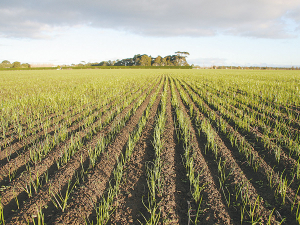Industry-wide approach helps farmers succeed
New Zealand farmers may be faced with increasing business challenges, but at least one sector has their back when it comes to collaborating for the greater good of pastoral agriculture in this country.
 Research shows ryegrass seed shown early in dry autumn conditions germinates well after weeks with no rain.
Research shows ryegrass seed shown early in dry autumn conditions germinates well after weeks with no rain.
For new pasture you can be proud of - even if it feels too dry to think about it right now - consider sowing seed before it rains, instead of waiting for the autumn weather to smile on you.
Research shows ryegrass seed sown early in dry autumn conditions germinates well after weeks with no rain, says Barenbrug pasture systems manager Blair Cotching.
"It can also grow more feed per hectare than seed sown later, and will probably persist longer too, giving you a better result all round."
Plus, you'll beat the rush for contractors when the rain does come, he says. "We've been asked so many times if it's okay to sow seed in the dry, we did a trial to confirm the answer."
In hot Waitako peat during an autumn drought, Barenbrug agronomists sowed perennial ryegrass seed with NEA2 endophyte in late February, March and April.
The earliest sowing had it the hardest - the soil reached over 49 degrees C at seed depth (2cm), with no rain for 43 days.
Even so, this February-sown seed went on to grow 2 tonnes of dry matter per hectare more than seed sown post-rain in April, and the endophyte was fine, Blair says.
Ryegrass seed sown after 1 March and before the rain comes is poised for growth as soon as conditions are right.
If seed is still in the bag when the weather breaks, it can't grow. By then everyone else wants to do the same thing, so contractors are flat out and delays are inevitable especially the way things are now.
Because it starts growing as soon as it has enough moisture, seed sown early becomes new pasture that is ready for its first grazing sooner than if you wait and sow after the rain.
Why does this matter?
"That first grazing has a massive impact on your pasture establishment," Blair says. "It helps the young ryegrass plants grow denser and stronger before winter, when wet soils and heavy cows can damage pasture. And it gets the clover off to a good start."
An added bonus - clover seed likes early sowing, too, because the soil is warmer.
The benefits of sowing early don't stop in the paddock. If this technique suits your farm and your soils, it will also help you get organised ahead of time.
That means no rushing around at the last minute trying to get hold of seed, and a lot more peace of mind knowing you're as ready as you can be for one of the most important jobs of autumn.
A buoyant farm economy should make for a successful 2026 Southern Field Days, says chairman Steve Henderson.
OPINION: November 7 has been set by Christopher Luxon as ‘E day’ – election day.
The strong wool market has improved in the past six months, despite drops in production over recent years.
On January 5th at Te Pa Station, the World Sheep Shearing Records saw a new nine-hour strong wool ewes shearing record set by Simon Goss.
Recently awarded in the New Years Honours List for Services to Agriculture and Governance, well known dairy farmer Lloyd Downing has become an Officer of the New Zealand Order of Merit (ONZM).
International trade expert Stephen Jacobi says Winston Peters' objections to the Indian free trade deal are "ridiculous".
OPINION: There will be no cows at Europe's largest agricultural show in Paris this year for the first time ever…
OPINION: Canterbury grows most of the country's wheat, barley and oat crops. But persistently low wheat prices, coupled with a…